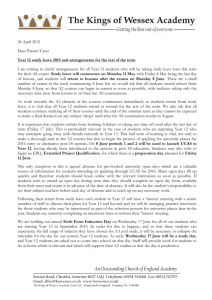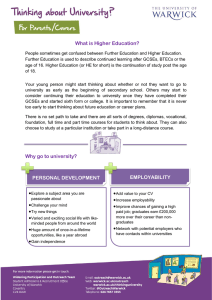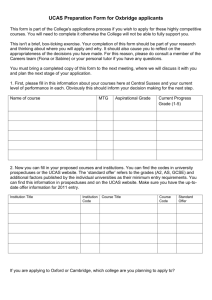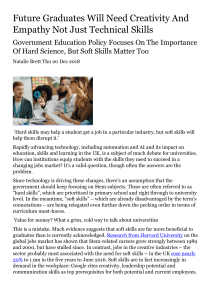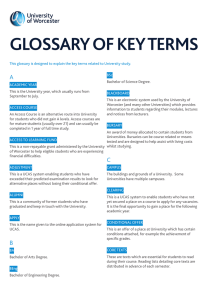Making A Level Choices
advertisement
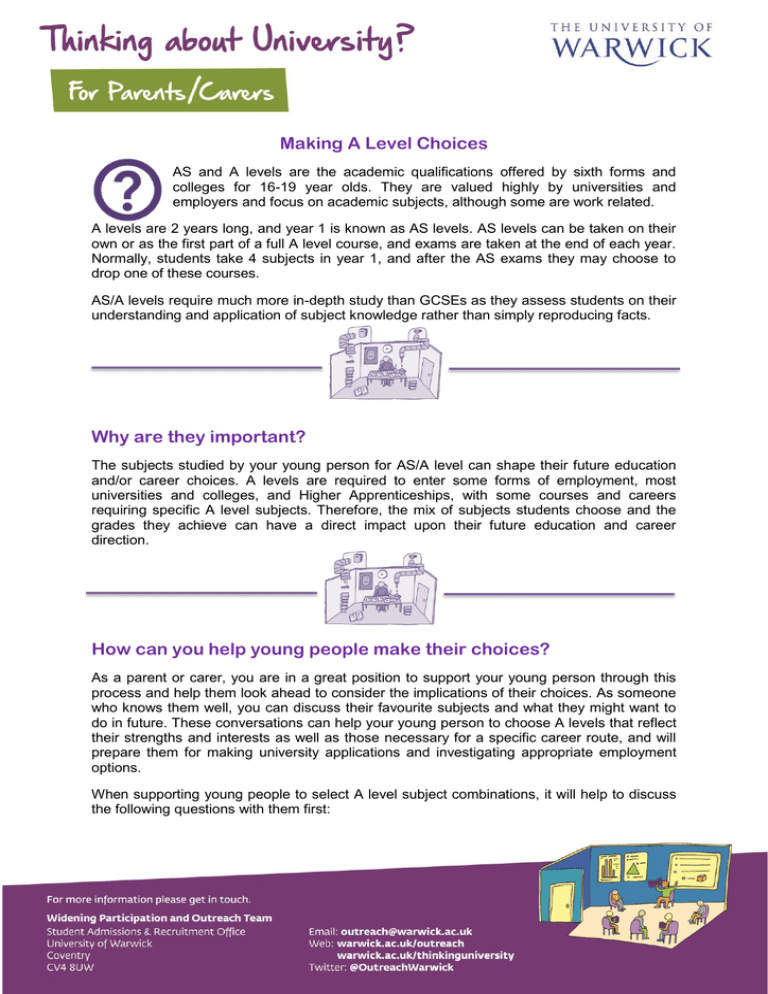
Making A Level Choices AS and A levels are the academic qualifications offered by sixth forms and colleges for 16-19 year olds. They are valued highly by universities and employers and focus on academic subjects, although some are work related. A levels are 2 years long, and year 1 is known as AS levels. AS levels can be taken on their own or as the first part of a full A level course, and exams are taken at the end of each year. Normally, students take 4 subjects in year 1, and after the AS exams they may choose to drop one of these courses. AS/A levels require much more in-depth study than GCSEs as they assess students on their understanding and application of subject knowledge rather than simply reproducing facts. Why are they important? The subjects studied by your young person for AS/A level can shape their future education and/or career choices. A levels are required to enter some forms of employment, most universities and colleges, and Higher Apprenticeships, with some courses and careers requiring specific A level subjects. Therefore, the mix of subjects students choose and the grades they achieve can have a direct impact upon their future education and career direction. How can you help young people make their choices? As a parent or carer, you are in a great position to support your young person through this process and help them look ahead to consider the implications of their choices. As someone who knows them well, you can discuss their favourite subjects and what they might want to do in future. These conversations can help your young person to choose A levels that reflect their strengths and interests as well as those necessary for a specific career route, and will prepare them for making university applications and investigating appropriate employment options. When supporting young people to select A level subject combinations, it will help to discuss the following questions with them first: What do you like best about the subjects you enjoy the most? What subjects don’t you enjoy? What sorts of tasks would you like to do in a job? What skills would you like to develop? What are your career aspirations? What subjects do you think you are best at? What subjects do you find most interesting? Would you like to go to university? If so, what subjects would you consider studying? If your young person does have a strong idea of what they want to study at university and/or pursue as a career, you need to identify the preferred courses required for particular subjects and/or professions. For guidance on recommended A level choices for specific educational or career routes, these websites are useful: university.which.co.uk/advice/what-a-levels-do-you-need-for-the-degree-you-want-tostudy ucas.com nationalcareersservice.direct.gov.uk/youngpeople prospects.ac.uk However, subject/career specific entry requirements vary across organisations, so it is always worth checking directly with a university or company to clarify which A levels they want to see on a CV or application. Keeping their options open It is important not to narrow down young people’s options too early; whilst they might want to be a dentist now, in two years’ time they could change their mind! Equally, if a student is unsure as to what they want to do in the future, it would be useful to take a broad range of subjects at A level so they have the ability to choose from a range of degrees and/or employment opportunities. Your young person could consider taking a selection of the following subjects (together with a new subject they are curious about or an old favourite), as they are the most commonly asked for by universities across a variety of courses: Biology History Chemistry Maths English Modern Languages Geography Physics Remember though that the most important factor in choosing A levels is ENJOYMENT! Your young person will study these subjects intensely for up to two years, so it is crucial that they are passionate about them. Further Information Take a look at some of these websites for more information about supporting young people to choose A levels: http://www.theguardian.com/education/2012/aug/23/what-alevel-subjects-to-pick http://www.careerpilot.org.uk/info/a-levels/choosing-your-a-levels-what-you-/ http://www.ucas.com/how-it-all-works/parents-and-guardians http://www.russellgroup.ac.uk/informed-choices.aspx



